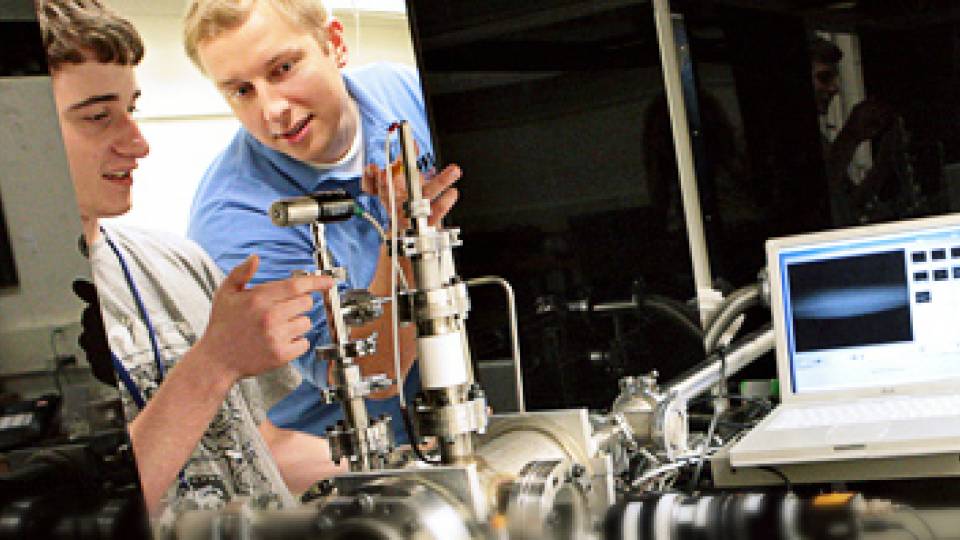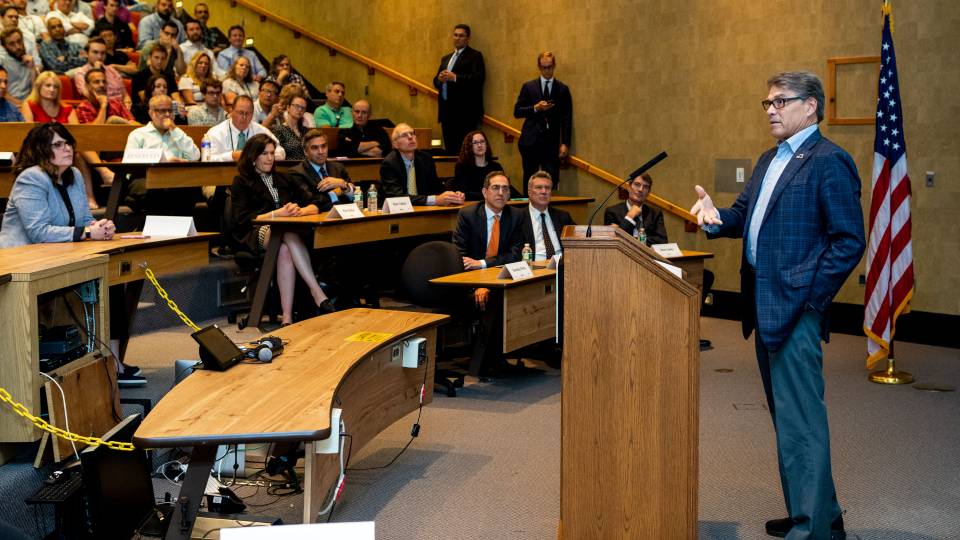If you happened to be in the lobby of the Princeton Plasma Physics Laboratory's (PPPL) Lyman Spitzer Building on a recent Friday morning, you would have seen the next generation of top scientists preparing to launch their careers. Twenty-five undergraduates from colleges across the country spent this summer at the laboratory as interns, working on projects ranging from figuring out how to remotely steer a set of mirrors that will be built into the upcoming ITER fusion machine to studying how nanoparticles grow inside plasmas. And they were presenting their work to researchers and policymakers.
This summer's cohort of interns was part of the U.S. Department of Energy's (DOE) Science Undergraduate Laboratory Internship (SULI) program. Launched in 2004, the SULI program is sponsored and managed by the DOE Office of Science's Office of Workforce Development for Teachers and Scientists, which partners with DOE laboratories across the country to encourage undergraduate students to pursue careers in science, technology, engineering and mathematics.

New Jersey Assemblywoman Donna Simon talks with PPPL intern and Lehigh University student Cara Bagley. Bagley was one of 25 undergraduates from colleges around the country who spent time at the laboratory as part of the Science Undergraduate Laboratory Internship program. (Photos by Elle Starkman, Princeton Plasma Physics Laboratory)
At the beginning of the 10-week program, the interns must complete a one-week course in plasma physics. Then, said DeeDee Ortiz, Program Administrator in PPPL's Science Education Department, each intern was paired with a mentor on the PPPL staff and began working on a research project. The interns had several requirements — including writing an abstract, writing a research paper and peer-reviewing another intern's poster — the last of which was the poster session in the lobby of the Lyman Spitzer Building.
Undergraduates, however, weren't the only students interning at PPPL this summer. A group of 10 high school students participated in their own internship program. And like the SULI students, the high schoolers were matched with laboratory scientists and assigned to research projects. In addition, the high school interns met with Princeton University engineering professors to learn more about pursuing STEM majors in college. At the end of the summer they had to write a research paper, craft an abstract suitable for the general public and create a poster. High school interns also evaluated another intern's poster and oral presentation.

PPPL intern Jacob Maddox, who attends the University of California-Berkeley, and his mentor, physicist Luis Delgado-Aparicio, share their research on soft x-ray electron temperature measurements.
Conversations with the SULI interns revealed deep satisfaction with the program. William McCarthy, a rising senior from Cape Elizabeth, Maine, majoring in physics at Worcester Polytechnic Institute, now plans to study plasma physics in graduate school. "I loved every minute of my internship," he said.
For some interns, their experience was the continuation of a long relationship with PPPL. "I had a great time," said Hadar Lazar, a rising senior at the University of Chicago majoring in physics who has spent four consecutive summers working at the lab. "I first came here the summer after I finished high school. PPPL has really taken me under its wing."
The younger interns found the experience valuable, too. "We aren't able to experience research like this in high school," said Sweta Subramaniam, a rising senior at Hightstown High School.
And their interactions with PPPL staff were just as memorable. "Our mentor, Charlie Gentile, put a lot of time and effort into creating a wonderful experience for us," said Lara Balick, who this spring graduated from Kinnelon High School and plans to attend Dartmouth College this fall.
In addition, two members of the New Jersey General Assembly — Elizabeth Muoio (District 15) and Donna Simon (District 16) — stopped by the poster session to talk with the participants.

PPPL intern Amanda Lewis, an undergraduate at Rensselaer Polytechnic Institute, and her mentor, physicist Charles Skinner, collaborated on the research she presented at the poster session.
While the internship program helps students hone their research skills, it also helps PPPL recruit the next generation of plasma physicists.
"Completing a summer internship at PPPL increases the chances that a student will enter a Ph.D. program in general, and a plasma physics program in particular," said Andrew Zwicker, head of PPPL's Science Education Department. "This is a crucial component of building our future workforce."
Hopes and expectations for these outstanding students are high. "I truly believe that one day, one of these students will come back to PPPL with a whole new perspective on fusion energy," Ortiz said. "Then he or she will solve the fusion puzzle and save the world! That's why this program, and others like it, are so important."



